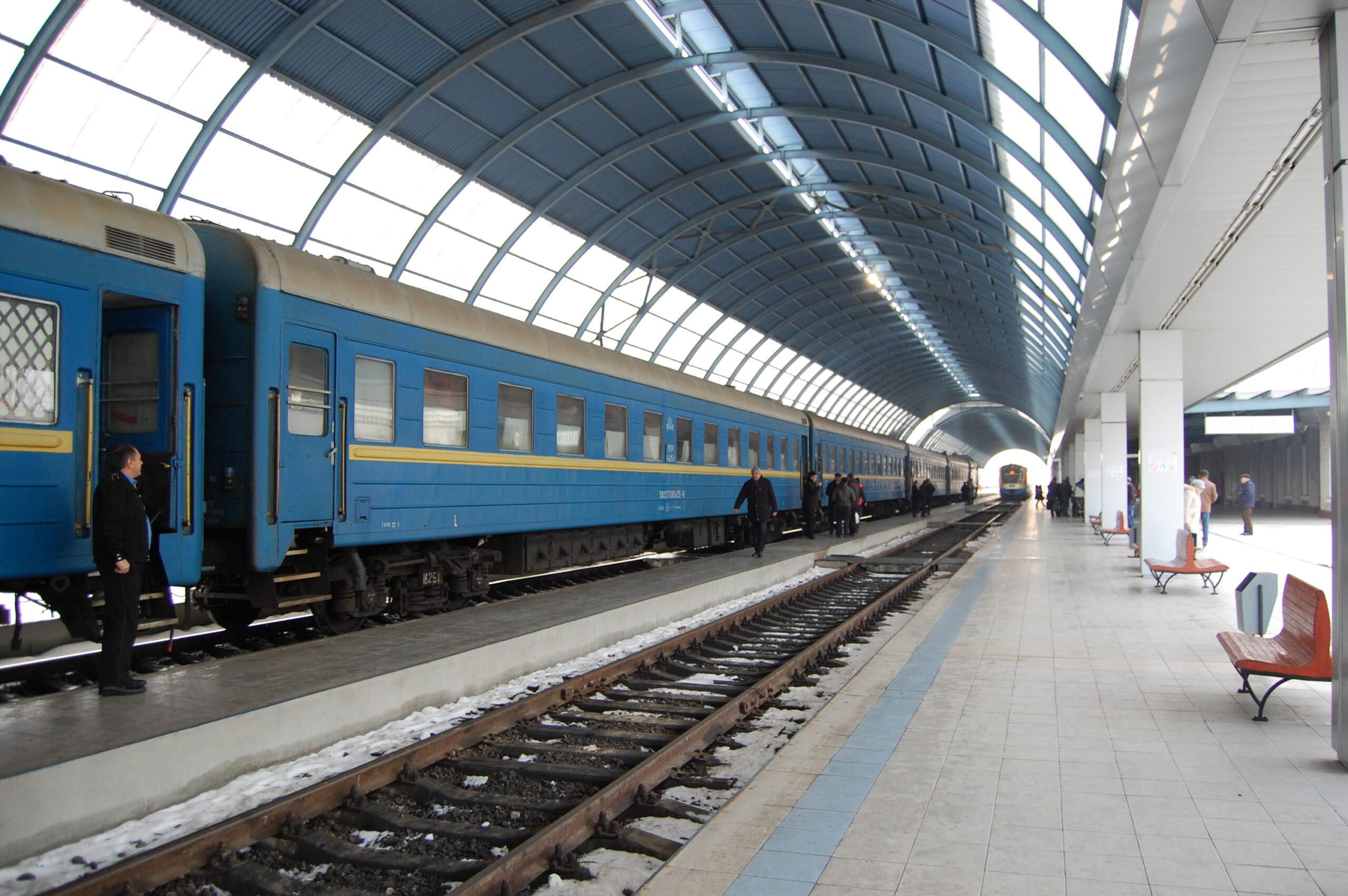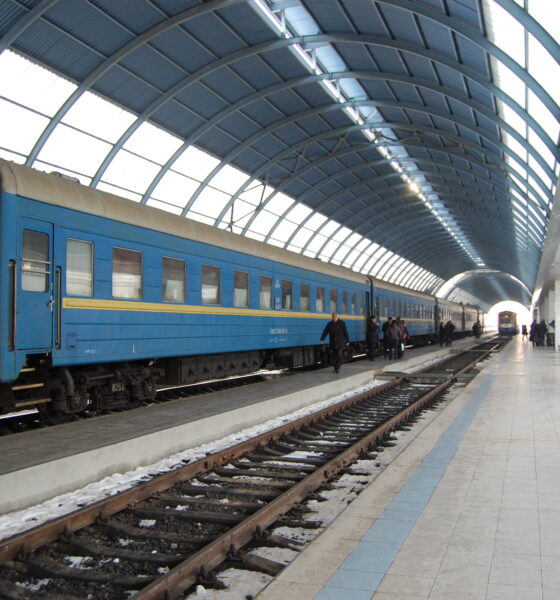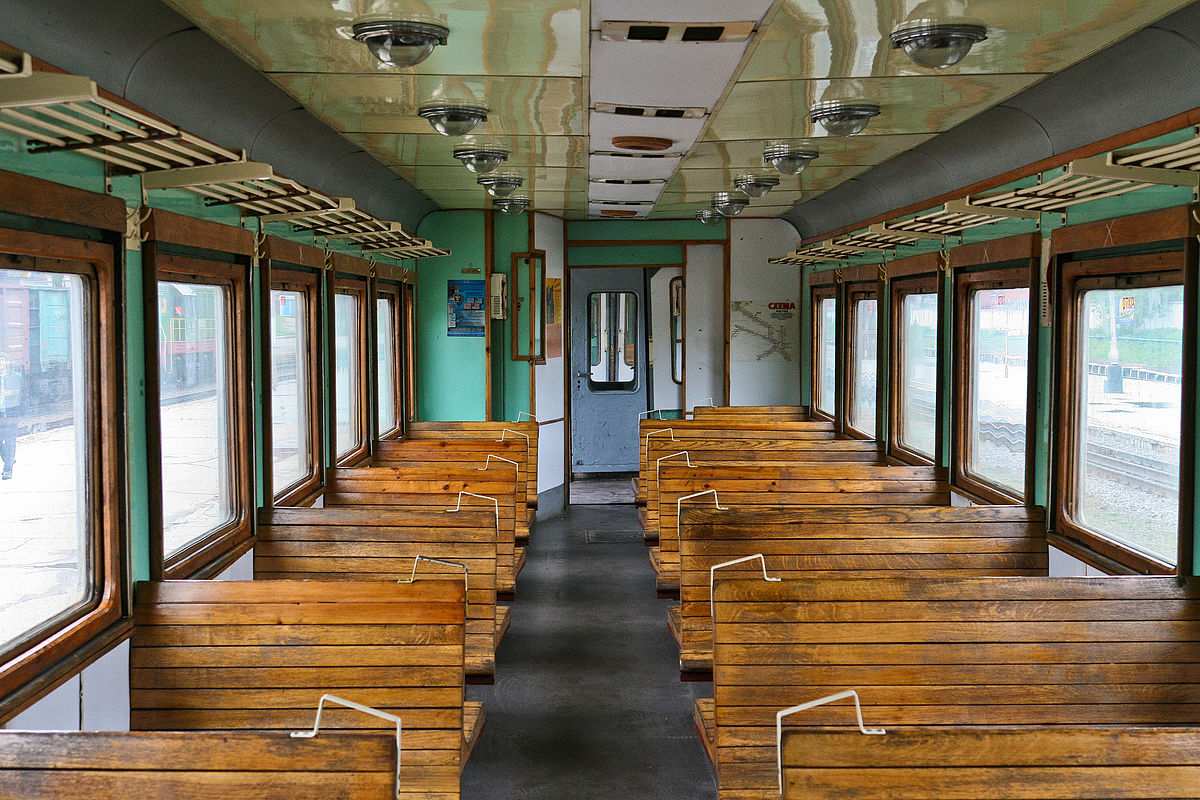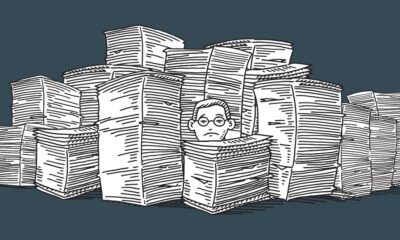

Economy
On the verge of insolvency: Who is interested in bankrupting the state-owned railway operator from Moldova?
“A journey to the past” – this is how Moldovan trains are called. They are old, cold, very slow, but also extremely cheap. Trains and railway stations are like museum exhibits. A lot of them are not decommissioned due to the lack of an alternative. Still, anyone born in the 90’s or earlier has some childhood memories related to this means of transportation.

Inside a Soviet train Source: train-photo.ru
SOE “Calea Ferata a Moldovei” (tr. as Railway of Moldova) is the only railway operator in the country (both passenger and cargo transportation). The company’s management announced, at the beginning of February, their intention to interrupt the service of all local and suburban trains starting February 12 in order to cut down operating expenses, as well as sell old metal equipment and some fixed assets to raise money and pay outstanding wages, as being mentioned in the recovery plan approved by the Board of Directors, which was presented in front of all Members of Parliament (MPs).
“We noticed that these shipments only bring losses, no one subsidises them, no one finances them. Moreover, these suburban trains are outdated and dangerous to passengers. It gets really hot in the summer and no one can guarantee that there will be no fires on these trains,” said acting General Manager of the state-owned enterprise (SOE), Adrian Onceanu. Later on, the SOE administration denied that such measures would have to be implemented, claiming that this was just a proposed option.
The root causes
Current financial problems of SOE “Calea Ferata a Moldovei” (CFM) are actually more than a decade old. Already in 2019, there were premises for bankruptcy of the company. The corporate financial reports for 2019 displayed a net loss of 26.5 million lei (more than 73 million lei in 2018) and a total debt of 464 million lei (569 million lei in 2018). About 33 million lei were recorded as unpaid wages, which represented 14% of company’s current liabilities. At the end of 2020, the total debt of the SOE amounted to 459.4 million lei.
According to the company data, 70% of commuter train passengers are railway workers who travel for free.
In December 2020, the railway workers started protests because they had not been paid for several months. As the chairman of the railway workers’ union told NewsMaker, almost 7000 employees didn’t received their salaries since September 2020, the total amount of the debt amounting to at least 60 million lei. The state-owned enterprise has a shortage of funds because of the debt to the state budget (23.5 million lei as unpaid taxes for October and November 2020), the coronavirus pandemic consequences, as well as high cargo transportation costs for international routes that have to make big detours in conflict zones (Ukraine, for example).
Last spring, CFM stopped its international passenger traffic due to the pandemic and cancelled some of the most important domestic passengers routes. Only a few routes to the north and east of the country remained. That cut down from the company’s revenue even more.
At the end of 2019, SOE “Calea Ferata a Moldovei” had 7099 employees. Nowadays, the company has around 6000 employees.
What’s more, the company employees have been experiencing periods of not receiving their wages for 6 years in a row. That is beside the fact that their wages are among the lowest in the country. The company data for 2016 (the most recent available) showed that the average salary for a transportation worker was almost 4000 lei (190 euros, according tot the current exchange rate).
No Government help for a state-owned company
CFM asked the Government for help with paying salaries, especially during the pandemic period, when a part of the SOE activity was closed down. As the representatives of the railway workers’ union claimed, there were nothing more but promises.
On the contrary, the state tax service institution has blocked some accounts of CFM in order to partially cover the company’s debt to the state budget.
A parliamentary commission was formed for investigating the situation at the Moldovan railway company. The commission is supposed to submit a final report at the beginning of April. Not all MPs were convinced of the commission’s usefulness though, claiming that bankrupting the SOE and selling it for nothing is what actually is intended. Also, the SOE management made accusations, stating that certain political forces used accounting figures for manipulating and aggravating the situation even further.
Media coverage, employees’ protests, as well as the debates in Parliament have stimulated creditors to claim the outstanding amounts, asking the court to block the accounts of CFM.
While trying to contain the panic, the company management made several statements, saying that, despite the difficulties, CFM is following an established comprehensive program of reorganization and modernization of the railway infrastructure financed by European partners. According to them, the implementation of the plan began to deliver results: purchase of new locomotives, rehabilitation of infrastructure and purchase of automated equipment. “We rely on your understanding and we assure you that if no artificial obstacles are created, CFM will return to the development path,” said, Vitalie Mucan, Deputy Director for Strategic Planning.
Economist of the Expert-Grup Analytical Center, Stanislav Madan, believes that all political parties that ever controlled this strategic enterprise tried to gain material benefits. “The only difference is that, before, there were more resources and higher workloads. Now, they have all declined. Therefore, the thefts are more visible.”
Photo: unknown
Society
“They are not needy, but they need help”. How Moldovan volunteers try to create a safe environment for the Ukrainian refugees

At the Government’s ground floor, the phones ring constantly, the laptop screens never reach standby. In one corner of the room there is a logistics planning meeting, someone has a call on Zoom with partners and donors, someone else finally managed to take a cookie and make some coffee. Everyone is exhausted and have sleepy red eyes, but the volunteers still have a lot of energy and dedication to help in creating a safe place for the Ukrainian refugees.
“It’s like a continuous bustle just so you won’t read the news. You get home sometimes and you don’t have time for news, and that somehow helps. It’s a kind of solidarity and mutual support,” says Vlada Ciobanu, volunteer responsible for communication and fundraising.
The volunteers group was formed from the very first day of war. A Facebook page was created, where all types of messages immediately started to flow: “I offer accommodation”, “I want to help”, “I want to get involved”, “Where can I bring the products?”, “I have a car and I can go to the customs”. Soon, the authorities also started asking for volunteers’ support. Now they all work together, coordinate activities and try to find solutions to the most difficult problems.
Is accommodation needed for 10, 200 or 800 people? Do you need transportation to the customs? Does anyone want to deliver 3 tons of apples and does not know where? Do you need medicine or mobile toilets? All these questions require prompt answers and actions. Blankets, sheets, diapers, hygiene products, food, clothes – people bring everything, and someone needs to quickly find ways of delivering them to those who need them.
Sometimes this collaboration is difficult, involves a lot of bureaucracy, and it can be difficult to get answers on time. “Republic of Moldova has never faced such a large influx of refugees and, probably because nobody thought this could happen, a mechanism of this kind of crisis has not been developed. Due to the absence of such a mechanism that the state should have created, we, the volunteers, intervened and tried to help in a practical way for the spontaneous and on the sport solutions of the problems,” mentions Ecaterina Luțișina, volunteer responsible for the refugees’ accommodation.
Ana Maria Popa, one of the founders of the group “Help Ukrainians in Moldova/SOS Українці Молдовa” says that the toughest thing is to find time and have a clear mind in managing different procedures, although things still happen somehow naturally. Everyone is ready to intervene and help, to take on more responsibilities and to act immediately when needed. The biggest challenges arise when it is necessary to accommodate large families, people with special needs, for which alternative solutions must be identified.
Goods and donations
The volunteers try to cope with the high flow of requests for both accommodation and products of all kinds. “It came to me as a shock and a panic when I found out that both mothers who are now in Ukraine, as well as those who found refuge in our country are losing their milk because of stress. We are trying to fill an enormous need for milk powder, for which the demand is high and the stocks are decreasing”, says Steliana, the volunteer responsible for the distribution of goods from the donation centers.
Several centers have been set up to collect donations in all regions of Chisinau, and volunteers are redirecting the goods to where the refugees are. A system for processing and monitoring donations has already been established, while the volunteer drivers take over the order only according to a unique code.
Volunteers from the collection centers also do the inventory – the donated goods and the distributed goods. The rest is transported to Vatra deposit, from where it is distributed to the placement centers where more than 50 refugees are housed.
When they want to donate goods, but they don’t know what would be needed, people are urged to put themselves in the position of refugees and ask themselves what would they need most if they wake up overnight and have to hurriedly pack their bags and run away. Steliana wants to emphasise that “these people are not needy, but these people need help. They did not choose to end up in this situation.”
Furthermore, the volunteer Cristina Sîrbu seeks to identify producers and negotiate prices for products needed by refugees, thus mediating the procurement process for NGOs with which she collaborates, such as Caritas, World Children’s Fund, Polish Solidarity Fund, Lifting hands, Peace Corps and others.
One of the challenges she is facing now is the identifying a mattress manufacturer in the West, because the Moldovan mattress manufacturer that has been helping so far no longer has polyurethane, a raw material usually imported from Russia and Ukraine.
Cristina also needs to find solutions for the needs of the volunteer groups – phones, laptops, gsm connection and internet for a good carrying out of activities.
Hate messages
The most difficult thing for the communication team is to manage the hate messages on the social networks, which started to appear more often. “Even if there is some sort of dissatisfaction from the Ukrainian refugees and those who offer help, we live now in a very diverse society, there are different kind of people, and we act very differently under stress,” said Vlada Ciobanu.
Translation by Cătălina Bîrsanu
Important
#WorldForUkraine – a map that shows the magnitude of the world’s actions against Russian aggression

The international community and volunteers from all over te world have launched #WorldForUkraine as a platform that shows the magnitude of the world’s actions against the Russian aggression. In a digital world – it is an interactive map of public support of Ukrainians under the hashtag #WorldForUkraine – rallies, flash mobs, protests around the world. In the physical dimension – it is your opportunity to take to the streets and declare: “No to Putin’s aggression, no to war.”
„Today, along with the political and military support, emotional connection with the civilized world and truthful information are extremely important for Ukraine. The power to do it is in your hands. Join the #WorldForUkraine project and contribute to the victorious battle against the bloodshed inflicted on Ukraine by the aggression of the Russian Federation”, says the „about the project” section of the platform.
Go to the streets — Tell people — Connect and Unite — Become POWERFUL
Volunteers have launched #WorldForUkraine as a platform that shows the magnitude of the world’s actions against Russian aggression. In digital world – it is an INTERACTIVE MAP of public support of Ukrainians worldforukraine.net under the hashtag #WorldForUkraine – rallies, flash mobs, protests around the world. In the physical dimension – it is your opportunity to take to the streets and declare: “No to Putin’s aggression, no to war.” There you may find information about past and future rallies in your city in support of Ukraine. This is a permanent platform for Ukrainian diaspora and people all over the world concerned about the situation in Ukraine.
So here’s a couple of things you could do yourself to help:
* if there is a political rally in your city, then participate in it and write about it on social media with geolocation and the hashtag #WorldForUkraine
* if there are no rallies nearby, organize one in support of Ukraine yourself, write about it on social media with geolocation adding the hashtag #WorldForUkraine
The map will add information about gathering by #WorldForUkraine AUTOMATICALLY
Your voice now stronger THAN ever
All rallies are already here: https://worldforukraine.net
Important
How is Moldova managing the big influx of Ukrainian refugees? The authorities’ plan, explained

From 24th to 28th of February, 71 359 Ukrainian citizens entered the territory of Republic of Moldova. 33 173 of them left the country. As of this moment, there are 38 186 Ukrainian citizens in Moldova, who have arrived over the past 100 hours.
The Moldovan people and authorities have organized themselves quickly from the first day of war between Russia and Ukraine. However, in the event of a prolonged armed conflict and a continuous influx of Ukrainian refugees, the efforts and donations need to be efficiently managed. Thus, we inquired about Moldova’s long-term plan and the state’s capacity to receive, host, and treat a bigger number of refugees.
On February 26th, the Ministry of Labor and Social Protection of Moldova approved the Regulation of organization and functioning of the temporary Placement Center for refugees and the staffing and expenditure rules. According to the Regulation, the Centers will have the capacity of temporary hosting and feeding at least 20 persons, for a maximum of 3 months, with the possibility of extending this period. The Centers will also offer legal, social, psychological, and primary medical consultations to the refugees. The Center’s activity will be financed from budget allocations, under Article 19 of Provision no. 1 of the Exceptional Situations Commission from February 24th, 2022, and from other sources of funding that do not contravene applicable law.
The Ministry of Inner Affairs and the Government of Moldova facilitated the organization of the volunteers’ group “Moldova for Peace”. Its purpose is to receive, offer assistance and accommodation to the Ukrainian refugees. The group is still working on creating a structure, registering and contacting volunteers, etc. It does not activate under a legal umbrella.
Lilia Nenescu, one of the “Moldova for Peace” volunteers, said that the group consists of over 20 people. Other 1700 registered to volunteer by filling in this form, which is still available. The group consists of several departments:
The volunteers’ department. Its members act as fixers: they’re responsible for connecting the people in need of assistance with the appropriate department. Some of the volunteers are located in the customs points. “The Ministry of Inner Affairs sends us every day the list of the customs points where our assistance is needed, and we mobilize the volunteers”, says Lilia Nenescu.
The Goods Department manages all the goods donated by the Moldavian citizens. The donations are separated into categories: non-perishable foods and non-food supplies. The volunteers of this department sort the goods into packages to be distributed.
The Government intends to collect all the donations in four locations. The National Agency for Food Safety and the National Agency for Public Health will ensure mechanisms to confirm that all the deposited goods comply with safety and quality regulations.
The Service Department operates in 4 directions and needs the volunteer involvement of specialists in psychology, legal assistance (the majority of the refugees only have Ukrainian ID and birth certificates of their children); medical assistance; translation (a part of the refugees are not Ukrainian citizens).
According to Elena Mudrîi, the spokesperson of the Ministry of Health, so far there is no data about the number of Covid-19 positive refugees. She only mentioned two cases that needed outpatient medical assistance: a pregnant woman and the mother of a 4-day-old child.
The Accommodation Department. The volunteers are waiting for the centralized and updated information from the Ministry of Labor about the institutions offering accommodation, besides the houses offered by individuals.
The Transport Department consists of drivers organized in groups. They receive notifications about the number of people who need transportation from the customs points to the asylum centers for refugees.
The municipal authorities of Chișinău announced that the Ukrainian children refugees from the capital city will be enrolled in educational institutions. The authorities also intend to create Day-Care Centers for children, where they will be engaged in educational activities and will receive psychological assistance. Besides, the refugees from the municipal temporary accommodation centers receive individual and group counseling.
In addition to this effort, a group of volunteers consisting of Ana Gurău, Ana Popapa, and Andrei Lutenco developed, with the help of Cristian Coșneanu, the UArefugees platform, synchronized with the responses from this form. On the first day, 943 people offered their help using the form, and 110 people asked for help. According to Anna Gurău, the volunteers communicate with the Government in order to update the platform with the missing data.
Translation from Romanian by Natalia Graur

























